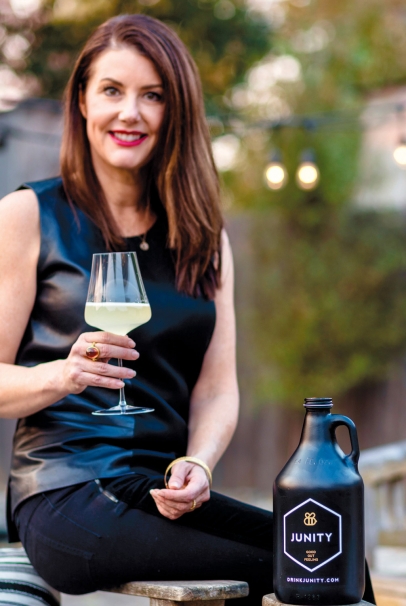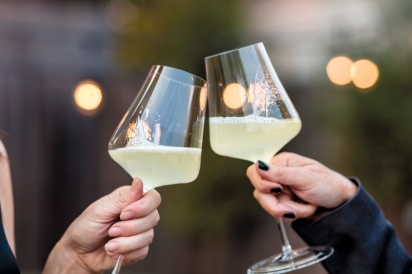Junity is Busting Out All Over
GREEN TEA AND HONEY MAKE FOR A KINDER, GENTLER KOMBUCHA
Carissa Ashman was spooning up a steaming slurp of chicken pho at Napa’s Kitchen Door restaurant, a bottle of sparkling mineral water alongside, when she found herself longing for more.
More, that is, beyond the bland beverage at hand. Something with greater verve, something that would do justice to the fragrant noodle soup, heady with Thai basil and cilantro, but that also wouldn’t upset her hypersensitive stomach.
That thirst propelled the public relations consultant on a journey to create a brand new beverage in the Napa Valley—not pressed from grapes, but cold-brewed from fermented biodynamic green tea and raw honey. Junity, named for the “jun” culture—a specific symbiotic culture of bacteria and yeast—it incorporates, is nonalcoholic, effervescent, full of probiotics and designed to be festive and beautiful enough in the glass to stand in for wine.
Like kombucha, it’s a tonic that may help foster gut health. But, unlike typical kombucha, which uses a different culture that thrives on black tea and cane sugar, Junity isn’t characterized by a harsh vinegary bite.
“I felt like kombucha was an acid bomb that burns on the way down,” Ashman says. “It also doesn’t pair well with foods. I wanted something lighter and more balanced. I wanted to create something like a Champagne.”
Ashman spent a year and a half tinkering, sourcing tea from India and organic honey from Oregon and Montana. She even enlisted Chef Daniel Gomez, former executive sous chef at Michelin-starred La Toque in Napa, to get the flavor just right—crisp, slightly tart and with a faint pop of pear on the palate.
“Working with live yeast and bacteria has challenges. Like wine, this is a living thing,” she says. “Weather can affect it, as well as the pressure in the air. Sometimes you control the ball, and sometimes Mother Nature does.”
Financing the business herself, Ashman started producing Junity in October 2018 in a commissary kitchen in Napa, packaging it in 187-milliliter bottles with a chic black label. The single-serve bottles, which have 35 calories and a 0.29% alcohol level, contain no preservatives, so they must be kept refrigerated.
Since then, she’s tripled production to about 40 gallons per week. Junity can now be found at nearly a dozen retailers and restaurants in California and Nevada, including Farmshop locations in both Marin and Santa Monica.
The first place to feature it was right where the idea all started— the Kitchen Door in Oxbow Public Market, where it’s now highlighted on the menu under “chef’s specials.” The restaurant, which pours the bottles ($6 each) in a glass over ice, now goes through a 48-bottle case every 10 days.
“I had everyone here try it, including the chefs. Everyone took to it right away,” says Tim Seberson, Kitchen Door general manager. “We’ve put new stuff out there on the menu before, where the response was just ho-hum. This just took off really fast. Even we were surprised.”
At Napa’s Miminashi, Junity even inspired a cocktail: Gin & Jun, a blend of Japanese gin made from yuzu and other citrus, oroblanco cordial, elderflower, lemon and Junity. Jessica Di Fede, co-owner and sommelier, appreciates that Junity has a base of green tea, which makes it especially fitting for her izakaya’s cuisine of Japanese-inspired small plates meant to be enjoyed with alcoholic drinks.
“It has a nice brightness of acidity and a little kombucha-like wildness without being over the top, she says. “It’s a really beautiful beverage.”
Michael Biesemeyer, managing partner of Flea Street Café in Menlo Park, thinks so, too. His establishment is one of the most recent to add Junity to its menu, where it’s served over large ice cubes embedded with fresh raspberries and habanero peppers. “We get a lot of requests for nonalcoholic drinks,” he says. “This is a big step along the lines of an adult beverage. It’s the experience of drinking—without the buzz.”
Even kids seem to take to it, including 6-year-old Grayson Pope, who calls it “the best.” He and his 4-year-old sister, Averie, drink the fizzy beverage regularly with their mother, Nicole Berlotti Pope, winemaker at Stolo Vineyards in Cambria. So much so that Ashman personally delivers a 2½-gallon mini keg to their home for the whole family to enjoy.
Although no scientific studies have been done yet on Junity, Berlotti Pope swears it helps her get through her grueling workload. “It’s a really healthy alternative to having a beer after a harvest day,” she says. “When you eat a lot of crappy food during harvest, having something healthy to drink is so good.”
Besides expanding production, Ashman hopes in the future to develop more flavors of Junity, and to give a portion of profits to organizations that support the welfare of bees.
Alicia Gomez Nilsson couldn’t be happier to have discovered the beverage while having Mother’s Day brunch at Farmshop in Marin. The Novato resident, who suffers from an autoimmune disease, eliminated all processed sugar from her diet nearly three years ago. It was no easy feat, especially when it came to giving up alcohol, particularly because her brother-in-law owns an online wine business and a vineyard in Bordeaux, and her father-in-law works for Southern Glazer’s Wine & Spirits. She fell for Junity on the spot, buying five bottles at Farmshop, then sending her husband to Hudson Greens & Goods at Napa’s Oxbow Public Market to buy 20 more bottles.
“When someone has health issues, socializing is hard when you’re at a party or at a restaurant. It’s hard to just order water,” she says. “I can bring this to a party now or look for it on menus. For me, it’s just brought back an excitement and joy I haven’t had in a while.”






